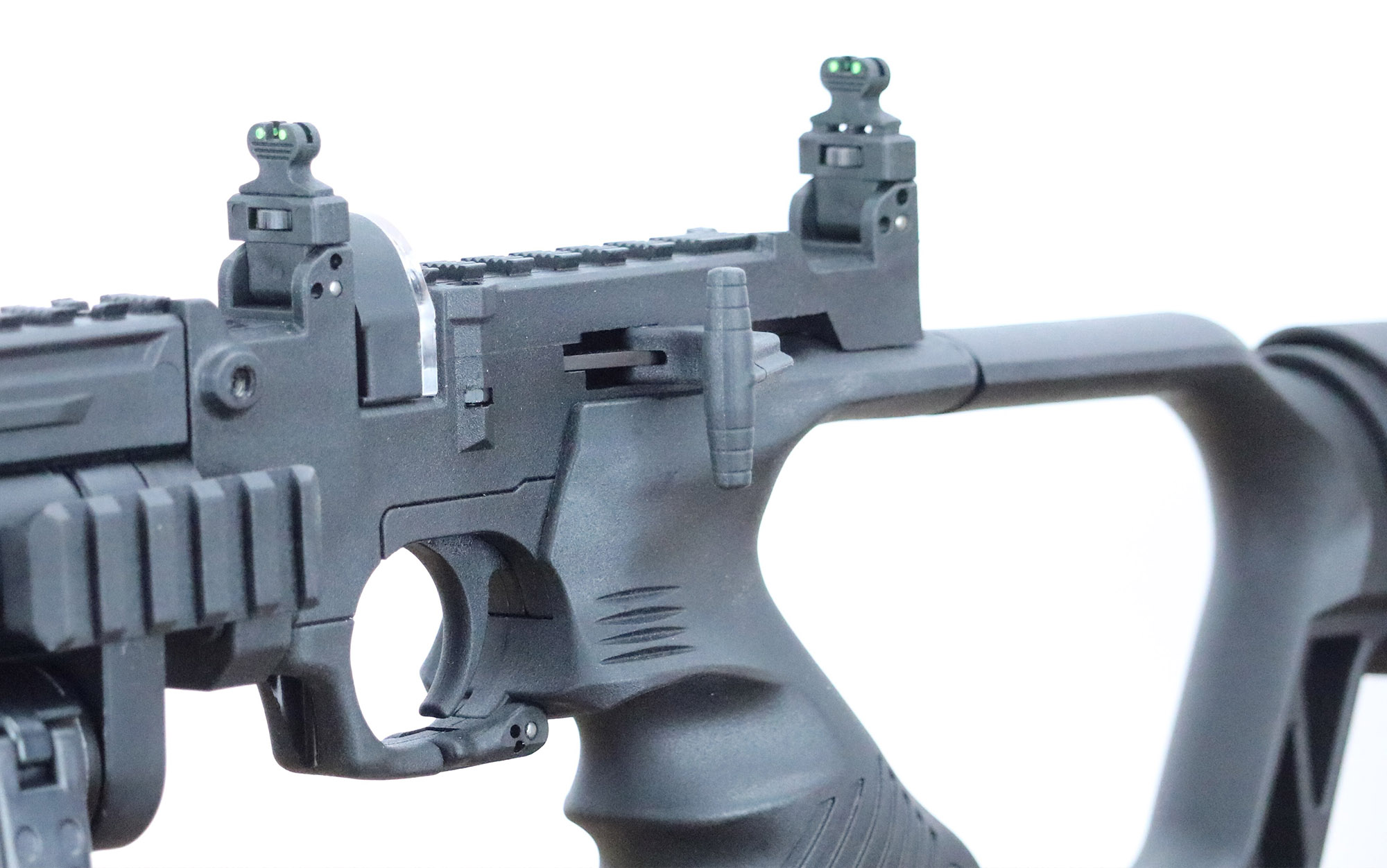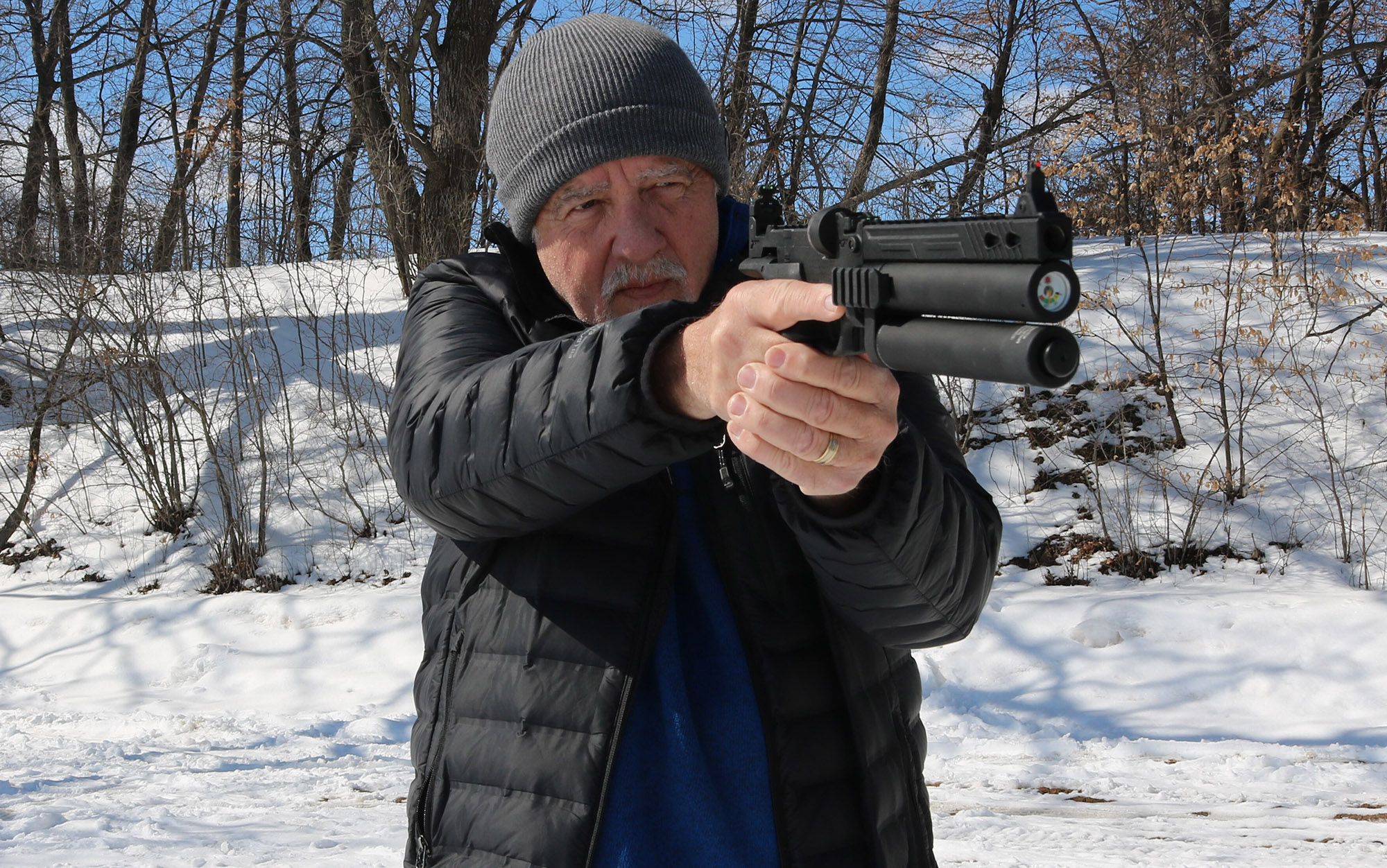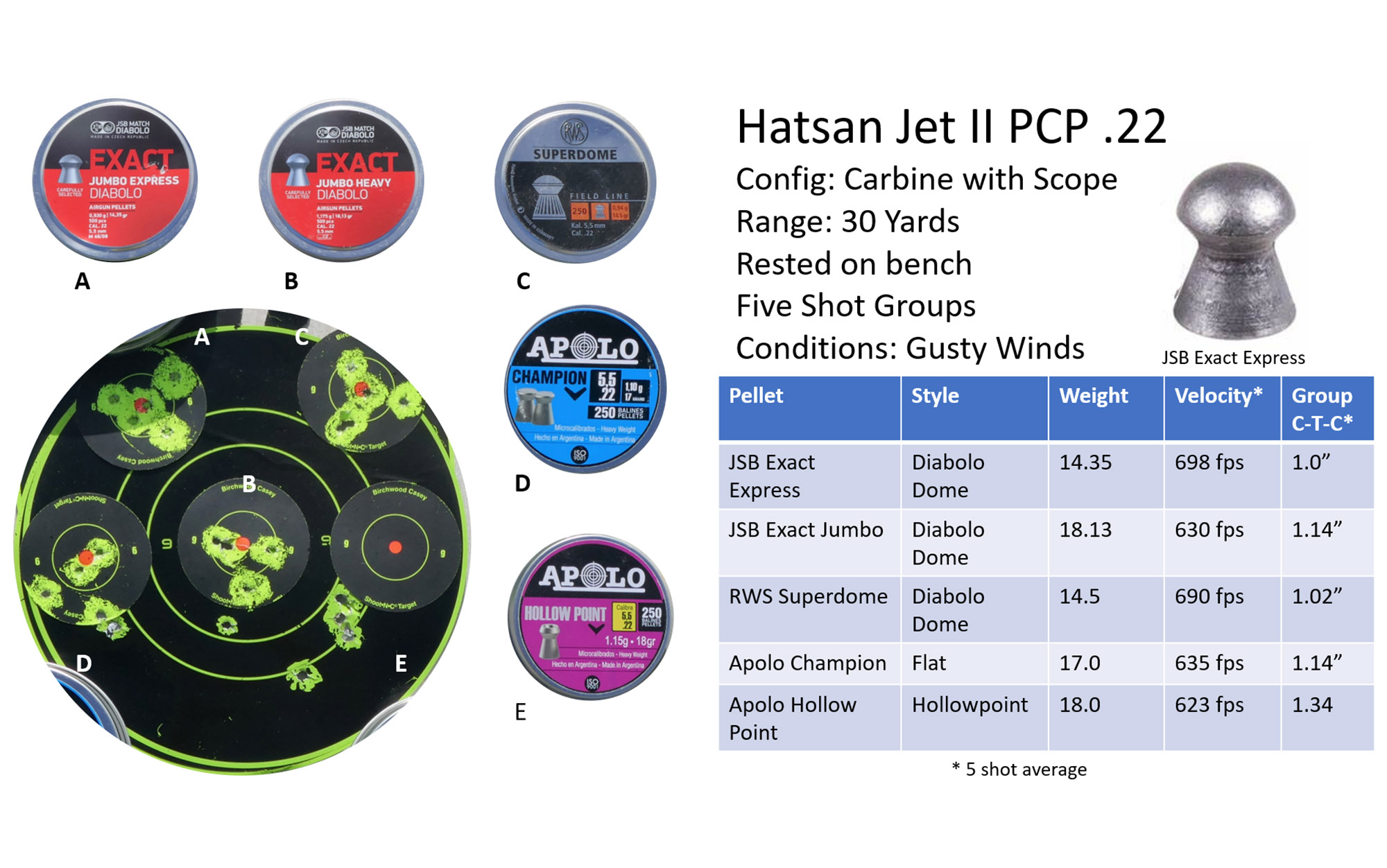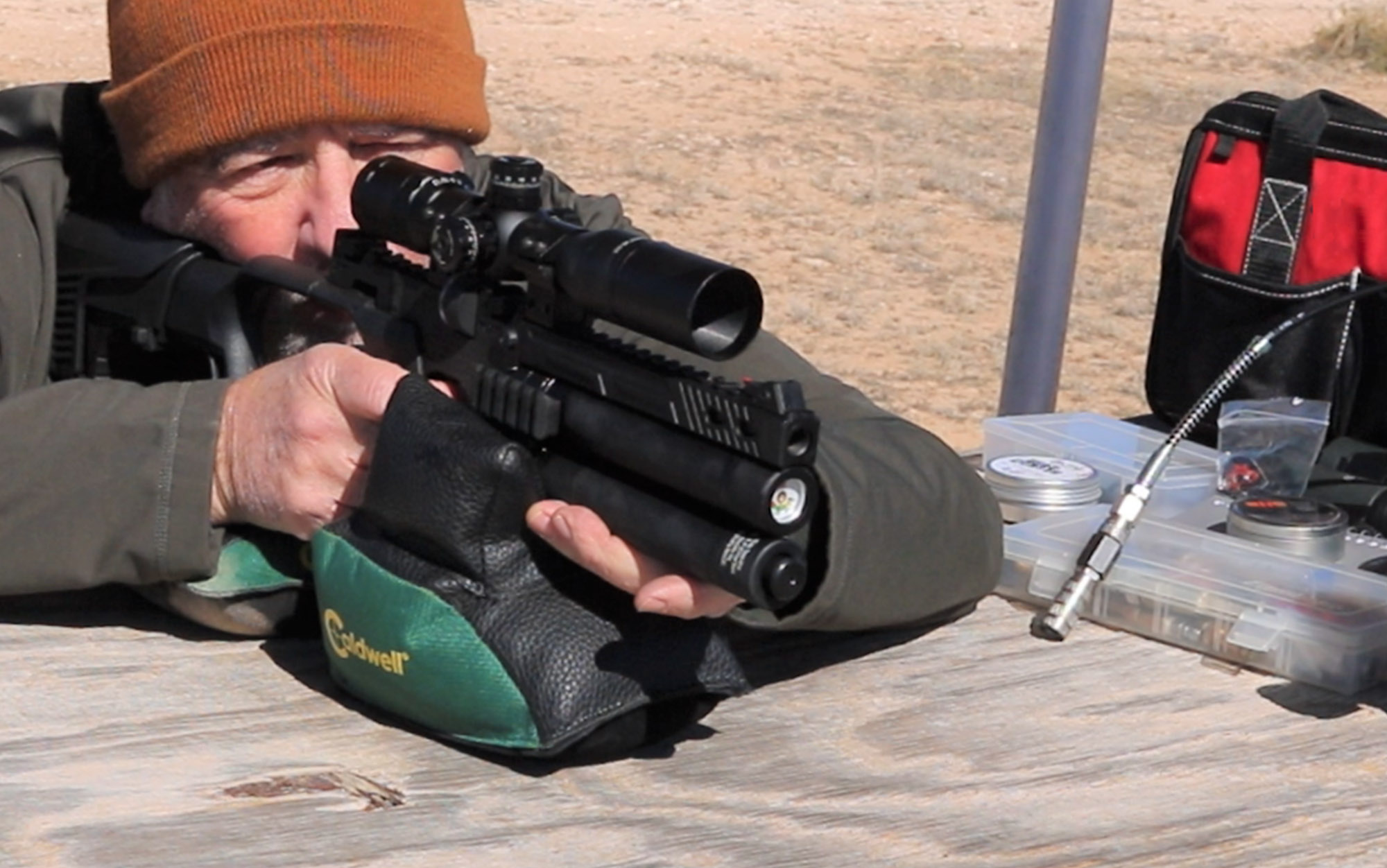We may earn revenue from the products available on this page and participate in affiliate programs. Learn More ›
The Hatsan Jet II is an air pistol that converts to a handy carbine by adding the included stock. It also shoots a .22 caliber pellet up to 700 fps. That power and versatility make it an exciting new option for pest control and small game hunting. But the proof is in the shooting, so I took one to the range to test its accuracy. Here’s how it performed.
Hatsan Jet II Specs and Features (.22 cal)
- Max Velocity: 700 fps
- Overall Length: 24.6 inches
- Weight : 3.4 pounds
- 11mm dovetail scope mount
- Muzzle Energy: 15.6 foot-pounds
- Barrel Length: 7.9 inches
- Shot Capacity: Seven
- Pre-charged pneumatic
- Max Shots per Fill: 42
- Operating Pressure: 3625 PSI / 250 BAR
- Shrouded
The Hatsan Jet comes in two configurations, the standard “Jet”, which has a single air reservoir positioned under the barrel, and the “Jet II” which comes equipped with a dual air reservoir that provides a significantly higher shot count. Both versions are available in .177, .22, and .25 calibers, and for this review, I opted for the Jet II in .22.
The MSRP for the Jet II is $349, but it is possible to find a street price under $300 with a bit of research. The feature set provided at this price point is impressive, but again for me it’s that ability to quickly convert between pistol and carbine that’s the main selling point.
Pistol and a Carbine

The first thing you notice when unboxing the Jet is that it contains both the pistol and the stock for the carbine conversion. Hatsan has developed a slick mounting system for conversion that allows the stock to be quickly mounted or dismounted without requiring tools. And once the stock is mounted, it can be adjusted for an individualized fit. The Jet has incorporated a number of Picatinny rails for mounting accessories and utilizes an 11 mm ramp for mounting a scope or red dot.
Action

The action is an easy cycling side lever located on the left side of the frame, which is optimized for shooting as a pistol. Cycling the action indexes the seven-shot magazine, and I was pleased to see that the gun ships with a spare magazine and a single-shot loading tray. There are three folding open sights positioned at the rear, midpoint, and muzzle of the gun for a variety of sighting options, and I found that I could still use the open sights with a red dot mounted.
Power Source
To fill the PCP’s air reservoir, there is a fill port that uses a proprietary quick-connect attachment at the distal end of the lower tube, with the termination of the upper tube capped with a pressure gauge for monitoring air usage. I think the best fill solutions for this gun are either a portable air tank such as the Hatsan 1.6 liter carbon fiber tank if you have a paintball or dive shop that can fill it up to 250 BAR (3625 psi), or for a few more bucks one of the Hatsan TactAir Portable Compressors will serve you well.
Testing the Hatsan Jet II in the Field

I was down in Texas on a javelina hunt a few weeks ago and took the Jet II along for some range work and fun shooting during downtime. On the day I set up at the bench, the winds were gusty and blowing around 5 to 15 mph, but I reckoned that shooting at a closer range (30 yards) would minimize the impact of the gusts. I had sandbags to rest the gun on, and since I wanted to assess the intrinsic accuracy of the platform, I configured it as a carbine and mounted a scope. I used the Leapers UTG 3-12×32 Mini SWAT Mil-dot scope, which perfectly matches this rig. To assess the Jet II with a selection of pellets, I filled the gun to 250 BAR, printed a five-shot group, refilled to 250 BAR, and repeated until I’d shot through all five brands of pellets.
These included the JSB Exacts, JSB Jumbos, RWS Superdome, Apolo Champion, and Apolo Hollow Points, and the details of these pellets are listed in figure 8. The majority of pellets tested were domed, also called round nose, Diabolo-style pellets. This is what I typically hunt with, and they are consistently accurate out of many guns. I did include hollow point and flat head designs for variation. This was a United Nations of pellets, the JSB are manufactured in the Czech Republic, the RWS in Germany, and the Apolo are imported from Argentina. Pellet weights ranged from 14.3 gr to 18.1 gr, and I loaded pellets straight out of the tin. There was no selection or resizing of pellets, with the exception of tossing out a couple with obviously damaged skirts.
I shot three rounds of five pellets from each brand as a visual control and arbitrarily selected one group to measure and present results from. All of these were quite close and demonstrated that the Jet II is pellet agnostic. Airguns can be very finicky about the projectiles they prefer, but in this case they all performed well enough for small-game hunting.

The JSB Exact generated an average of 698 fps for 15 fpe, and a group size of 1 inch. The JSB Jumbo, which was the heaviest pellet, yielded 630 fps for 16 fpe, and a group size of 1.14 inches. The RWS Superdome, a light pellet with a rigid skirt, generated 690 fps for 15 fpe and 1.02-inch group size. The Apolo Champion was the flat head pellet and to be honest I didn’t expect it to do well at this range and in the wind, but it generated 635 fps for 15 fpe and a group size of 1.14 inches. The last pellet was the Apolo Hollow Point, which was the next to heaviest pellet that produced 623 fps for 15.5 fpe and was the least accurate.
The bottom line, however, is that all five of these pellets were very close both in terms of accuracy and power/velocity. I believe that on any given day these results could shift with respect to best and worst but are so close that it doesn’t matter. What I did take away was that the accuracy produced by the Jet II in carbine mode (and scoped), was solid. I would happily grab any of these pellets for an afternoon of plinking but do have a preference for round nose pellets for small game hunting based on terminal performance.
What the Hatsan Jet II Does Best

As a pistol, I found this one of the better air-powered handguns to come along in quite a while, and it’s worth noting that the few others I’ve liked as much have been significantly more expensive. As a pistol, the gun definitely outshoots me, and I find it ergonomic, easy to handle, cycle, and sight with both open sights and a red dot.
As a carbine I found this gun to be accurate, appropriately powered for small game hunting out to 50 yards, and shootable. For me this was especially the case for off-hand and rapid snap shots. I’m a right-handed shooter and actually find the left-hand side lever fast and easy to manipulate when in carbine mode, allowing the trigger hand to be left in place while moving the lead hand back to cycle the gun. It would be natural for left-handed shooters. The magazine is a basic plastic affair, but worked reliably and has held up well over several tins of pellets.
But what this gun does better than most other handgun/carbine conversions I’ve shot is to strike the balance between a handgun and carbine. All too often the pistol component of these convertible guns is too heavy, too long, or too oddly shaped to really serve well as a pistol. I think the Jet II gets it right, and in the handgun trim it is not only manageable but feels like it was actually designed to be a handgun. In the carbine mode, the stock design and adjustability make it comfortable to shoot, more so than many ultra-carbines and bullpups I’ve used.
If you are looking for a plinking/small game gun for a youth or smaller shooter, this is an option to consider. The length of pull, when the buttstock is retracted, is quite short and even a small shooter can easily manage it. The gun is light and easy to cycle; the trigger functions well, and with the possibility to use several open-sight configurations or optics, it is a great training platform.
Read Next: Umarex NOTOS Review
Where the Hatsan Jet II Can Improve
If I look at areas where the gun might stumble, but I won’t say trip because I think this needs to be viewed in context, is that there are ultra-compact carbines on the market that may generate a higher power output or be more accurate. But these are guns that either don’t convert to a handgun, or they convert to a handgun that is impractical to use as such.
The trigger is not adjustable, has a medium-heavy pull, and there is a bit of take-up and over-travel. There is no way you could describe this as a target trigger, on the other hand I found it easy to shoot and it did not negatively impact accuracy, I never felt bothered by it.
I would prefer that the gun utilized a Weaver/Picatinny scope mount rather than an 11mm mount, or even better than that, if Hatsan had leveraged their well-known combination Picatinny/11mm rails on this gun. And finally, the report is fairly loud. It would be OK for indoor or backyard shooting, but it would not go unnoticed if you had a pressing need for stealth. The barrel housing/shroud is threaded, so I will look around for a suppressor to add to the kit.
Final Thoughts
So, where do I see this gun fitting in? Well, in general, if you are looking for a fun plinking or small game hunting gun and want to actually shoot it as both a pistol and a carbine, this gun would be hard to beat. Especially considering its wallet-friendly price tag. It is so fast to change configurations that the Jet II almost begs to be shot in both configurations.
Where I see the Jet II fitting into my gear rotation is that I have hunting permissions on several hobby farms located in more suburban areas, where a stealth gun that can easily and unobtrusively be transported offers a significant advantage. I used to do quite a bit of hunting with air pistols, many that I built myself, and after shooting this gun for several weeks now feel motivated to get back out in handgun mode.
I think that if you never intended to use the Jet II as a pistol but only as a compact carbine, there is still much to recommend it. But there are other options you would probably want to consider as well. Having said this, if you want to have a truly ultra-compact hunting rig or want a combination package that can actually be used as a powerful air pistol, the Hatsan Jet II is hard to beat.
